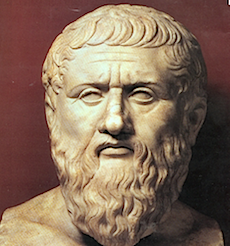Plato: Difference between revisions
Jump to navigation
Jump to search
(→Video) |
(→Video) |
||
| Line 20: | Line 20: | ||
** [https://www.youtube.com/watch?v=wco-OUAzc_Y Part 1] | ** [https://www.youtube.com/watch?v=wco-OUAzc_Y Part 1] | ||
** [https://www.youtube.com/watch?v=q_yrA9A0PaA Part 2] | ** [https://www.youtube.com/watch?v=q_yrA9A0PaA Part 2] | ||
** [ Part 3] | ** [https://www.youtube.com/watch?v=P_YMorQToKM Part 3] | ||
== Notes == | == Notes == | ||
Revision as of 16:21, 14 May 2018
ARTICLE UNDER CONSTRUCTION
ARTICLE UNDER CONSTRUCTION
C. Jinarājadāsa comments
C. Jinarājadāsa spoke of Plato as having been a great influence on his life:
As far as the West is concerned, ever since Plato wrote, wherever there is any kind of philosophical thought which deals with civilization or tries to understand the principles of art, every political writer and every exponent of art has more or less to follow Plato's trail. While you may differ from Plato in various ways, fundamentally you have to ally yourself with him on those thoughts.[1]
Additional resources
Audio
- The Esoteric Plato by Renee Weber
Video
- Turning-Points for the West: From Pythagoras and Plato through Gnosticism and Neoplatonism by Stephan Hoeller and Tony Lysy
Notes
- ↑ C. Jinarājadāsa, "Ruskin - A Herald of the New Age," The American Theosophist 34.11 (November, 1946), 245-247. Taken from unrevised notes of a lecture given in 1928.
